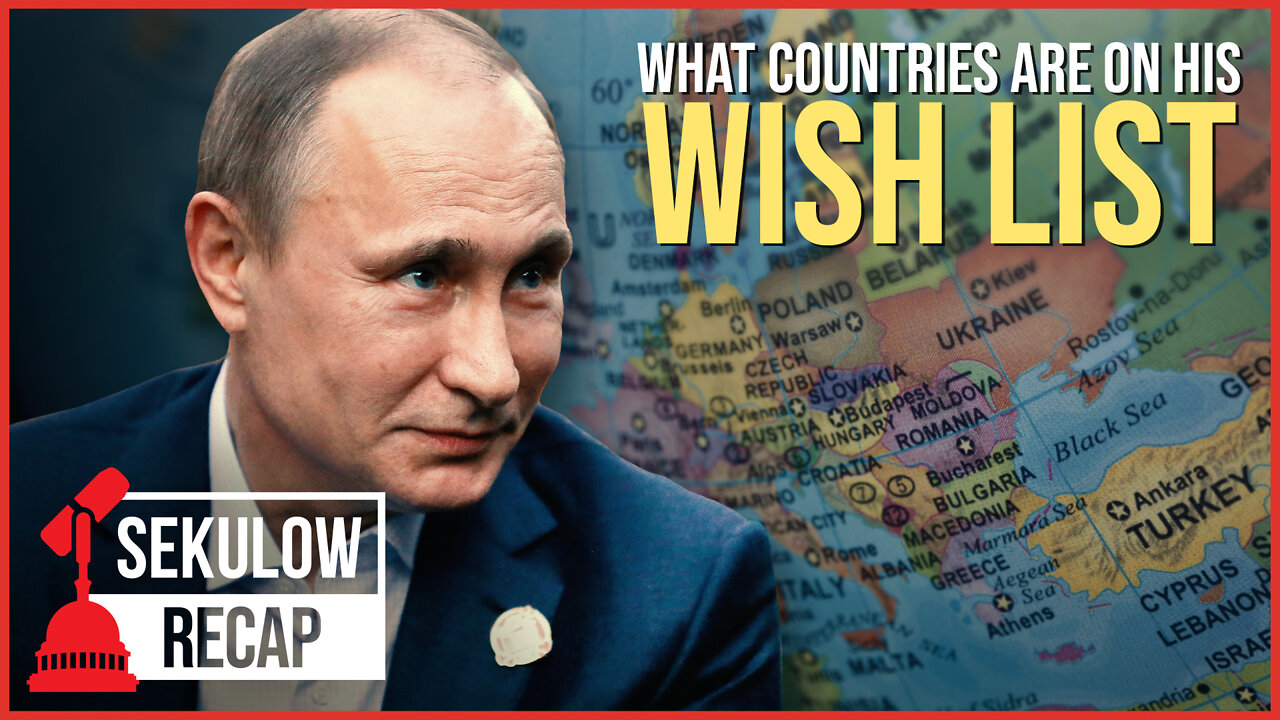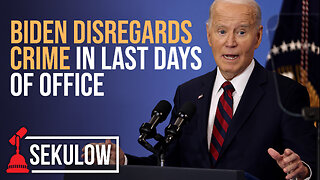Premium Only Content

What Countries Are Next on Putin's Wish List? Who Will Stop Him?
Russian President Vladimir Putin announced over the weekend that he has the Russian military on full nuclear alert. Even though Putin’s progress has slowed down in Ukraine, this is not the end of the Russian military. With this new development, Russia could turn to a nuclear attack on Ukraine or on any other country that gets in Putin’s way of taking over Ukraine.
Patrik Rako, a lawyer we have worked with who is based in Slovakia, a border state of Ukraine, joined Sekulow and gave his take on what the people in his country think of this move by Putin:
"Well, it was a pretty surprising move. Everybody is talking about that he is trying to escalate and maybe then will de-escalate this situation. But it is not completely true as far as I have already checked out the news. He ordered to . . . . reinforce the forces of the nuclear army in Moscow. So, he doesn’t look like he is going to de-escalate, but it looks like he is going to move forward. Our security analysts and military analysts are saying well it is a pretty unusual move, but we can’t underestimate it just because he already fulfilled all of his words, what he said even in 2008 and 2014 and right now."
Patrik also explained what would happen in his country if military action were to take place:
"Look, two weeks ago before the war in Ukraine, there was a split between the population and there was a huge fight to agree or conclude the DCA agreement between the United States and Slovakia, but it finally happened, and it was a huge achievement for the government to do that. And it looks like in the present terms, it was a very wise move. . . . So right now, the presence of the public is for the presence. As far as I know, I checked that our Secretary of State already sent regards to Germany and the Netherlands that they are going to send troops . . . to Slovakia which is pretty good right now."
The world has finally been responding by punishing Russia economically, including the SWIFT banking sanctions. ACLJ Director of Policy Harry Hutchison explained how these sanctions are different than the initial ones President Biden imposed:
"Sanctions that have been introduced over the weekend basically confirm what we knew last week – that the initial trench of sanctions that Biden put on the Russian banks were largely ineffective. But he claimed that they were the equivalent of SWIFT banking sanctions. But guess what? Once you put them on, you get virtually an immediate response. The ruble has fallen in value. Interest rates have risen, they have doubled from 9.5% in Russia to 20%. . . . So, Russia is now left with trying to create an alternative system, some might say an alternative reality with China, with respect to selling its oil. Now, I understand why President Biden was initially reluctant, part of the reluctance comes from the Europeans who have now changed their tune quite dramatically. They are now willing to send weapons and they are now willing to comply with their NATO obligations. I would add lastly that this is largely a European war and a largely European effort, and I think it is good to see the Europeans are finally stepping up to the plate."
Now that sanctions are ramping up around the world, Congress wants to jump on the bandwagon and impose additional sanctions on Russia. ACLJ Director of Government Affairs Thann Bennett gave his insight into the consensus in Washington, D.C. over additional sanctions:
"Both the chambers are returning as we speak. And honestly, both sides of the aisle are saying the same thing, I think they are going to ready a new set of sanctions that will likely clear the Congress pretty quick. . . . You’ve got war breaking out on the other side of the world, and yet both the House and Senate say they need to pass additional sanctions. . . . They say they want to move these new sanctions, and yet when they return to town that is the first order of business that they are taking up in the United States Senate?"
Today’s full Sekulow broadcast is complete with even more analysis of Russia's war on Ukraine.
-
 59:48
59:48
American Center for Law and Justice
1 day agoBiden Disregards Crime in Last Days of Office
14.5K10 -
 LIVE
LIVE
The Dilley Show
3 hours ago $9.76 earnedRoger Stone in Studio plus Q&A Friday! w/Author Brenden Dilley 12/27/2024
3,925 watching -

The Charlie Kirk Show
1 hour agoThe Great H-1B Battle + AMA | Lomez | 12.27.24
50.2K17 -
 11:39
11:39
Russell Brand
1 day agoWhat You're Not Being Told About The Syrian War
112K195 -
 DVR
DVR
Bannons War Room
1 year agoWarRoom Live
101M -
 1:49:21
1:49:21
Film Threat
4 hours agoBEST AND WORST OF 2024 + SQUID GAME SEASON 2 | Film Threat Livecast
18.6K -
 1:06:04
1:06:04
The Big Mig™
18 hours agoGlobal Finance Forum Powered By Genesis Gold Group
18.7K2 -
 34:38
34:38
Tudor Dixon
3 hours agoThe Changing Landscape Between Tech and Politics with Mike Benz | The Tudor Dixon Podcast
12.5K1 -
 2:23:58
2:23:58
Matt Kohrs
13 hours agoRumble's Stock Is EXPLODING!!! || The MK Show
68.6K6 -
 1:57:47
1:57:47
LFA TV
16 hours agoBOMBSHELL FINAL REPORT: BIDEN ADMIN SUPPRESSED WUHAN LAB LEAK | LIVE FROM AMERICA 12.27.24 11am EST
36.7K4